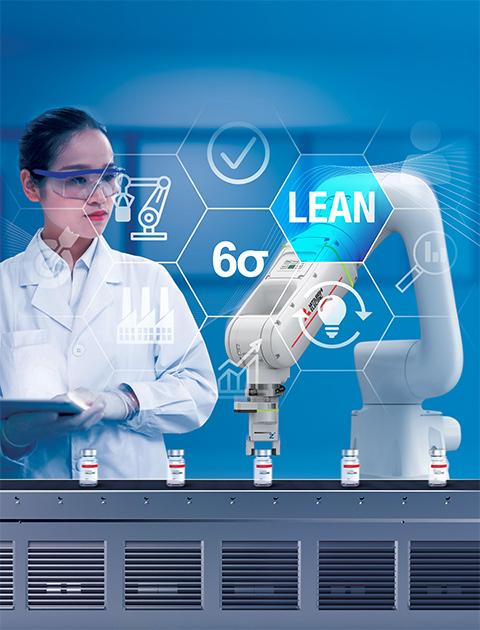
Posted to News on 20th Jan 2023, 14:18
Using digitalisation to create agile pharmaceutical production

David Bean, solutions group manager at Mitsubishi Electric, looks at how the digital transformation of pharmaceutical operations is key to more dynamic, agile manufacturing.
Future-oriented manufacturing is all about flexible and responsive operations that can promptly address market demands based on data and new insights. With highly regulated manufacturing processes, can pharmaceutical manufacturers embrace agile strategies to improve their competitiveness? The short answer is yes – provided the right automation solutions are used.
Companies in a multitude of sectors are rethinking their approach to manufacturing and adopting strategies driven by ‘smart’ technologies. Factories, for example, are being upgraded with innovative, data-driven technologies that communicate with each other to optimise operations. In effect, industrial automation represents a paradigm shift, where processes and operating conditions are no longer set in stone.
Instead, businesses can leverage real-time data and automated systems to determine process adjustments to overcome variability and maximise end product quality. By intelligently automating their production lines, manufacturers are creating an essential tool that can help them thrive in a competitive marketplace and overcome a wide range of challenges. These include fluctuations in raw materials and their properties, changing market needs and bespoke customer or public health requests.
This new era of manufacturing is also offering significant benefits to pharmaceutical companies, which are traditionally bound by strict and highly regulated process requirements. As such, automation is a key asset for businesses in this sector. Most importantly, data-driven solutions can help manufacturers ensure optimum batch efficiency through improved accuracy of control and immediate response to changes in operating conditions of the process to maximise quality of product. In addition, these technologies can support real-time release testing (RTRT) to speed up the time to market for key medicaments.
Ultimately, industrial automation is extremely versatile and can be deployed in various settings within a pharmaceutical enterprise. These can range from R&D to manufacturing, testing, packaging and equipment maintenance.
Automated solutions are also a must for pharmaceutical companies wanting to reach the pinnacle of agile manufacturing, delivering personalised medicine. Also known as precision medicine, these treatments are designed to address the needs and genetic makeup of individual patients. This is achieved using ‘data-hungry’ systems that feed on information to enable the production of customised medicines.
As technology evolves, companies are able to access more and more tools to develop innovative strategies to optimise healthcare and wellbeing. By determining the best approach to automating processes and incorporating modern components in production lines, pharmaceutical manufacturers can become more agile. This, in turn, will maximise flexibility, scalability and responsiveness, ultimately improving competitiveness.
Want the latest machine building news straight to your inbox? Become a MachineBuilding member for free today >>

















